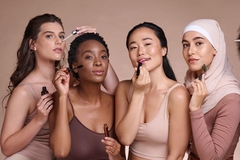Sephora job cuts in China signal tighter retail spending in leading beauty market
23 Aug 2024 --- Sephora is trimming its China-based workforce as local consumers tighten their spending on skin care and makeup — a cautioning trend brought into focus in recent earnings reports by leading beauty brands with a footprint in Asia retail.
A company spokesperson says the job cuts will impact less than 3% of the workforce, or the equivalent of fewer than 120 jobs. A Bloomberg report, meanwhile, estimates around 10% of Sephora’s China staff in offices and stores are affected.
It also believes Sephora China fired both office and store staff while persuading others to resign. Sources disclosed to the news agency that senior executives, including the country leads for retail and e-commerce, have left the company.

“In response to the challenging market environment and to ensure our future growth in China, Sephora China is currently streamlining our organizational structure in our head office to ensure we have the right capabilities for long-term sustainable growth,” reads a statement issued by the LVMH beauty retailer.
Cosmetic titans warn of softening in prestige retail
Sephora made its foray into China in 2005, growing its presence to 350 stores across more than 100 cities and selling online. The beauty retailer has roughly 4,000 employees in the country.
.jpg) Sephora made its foray into China in 2005, growing its presence to 350 stores across more than 100 cities and selling online.China has been hailed among the world’s fastest-growing beauty markets in recent years. In 2023, the Chinese beauty market registered 5.1% growth, reaching US$58 billion, according to data from the National Bureau of Statistics of China.
Sephora made its foray into China in 2005, growing its presence to 350 stores across more than 100 cities and selling online.China has been hailed among the world’s fastest-growing beauty markets in recent years. In 2023, the Chinese beauty market registered 5.1% growth, reaching US$58 billion, according to data from the National Bureau of Statistics of China.
While local brands have reached a watershed moment, leveling the playing field, international brands now have the upper hand.
However, surging unemployment rates and a slump in the property market have hit consumer confidence, with leading cosmetics firms warning of a significant impact on their China sales in recent weeks.
The Estée Lauder Companies also pointed to potential weakness in China. While it beat earnings estimates with its latest quarter, the cosmetics giant warned of “ongoing softness” with prestige beauty in mainland China and a decline in Asia travel retail.
Headwinds in the luxury market were also underscored in Beiersdorf’s first half-year results released earlier this month.
Restructuring follows losses
Sephora is the only global beauty omni-retailer with approximately 3,000 points of sale across 35 markets.
The restructuring comes as former Nike Asia e-commerce chief Xia Ding was appointed as Sephora’s new Greater China head. She states that the beauty market in China is at the “cusp of its next phase of growth.”
The beauty retailer incurred roughly CNY 330 million (US$60.4 million) in combined losses in 2022 and 2023, revealed in annual reports published by the skin care manufacturer Shanghai Jahwa United, which holds a 19% stake in the mainland business.
 China has been hailed among the world’s fastest-growing beauty markets in recent years.Sephora has zeroed in on its Chinese business while scaling back its regional footprint, closing its Taiwan and South Korea operations last year.
China has been hailed among the world’s fastest-growing beauty markets in recent years.Sephora has zeroed in on its Chinese business while scaling back its regional footprint, closing its Taiwan and South Korea operations last year.
Commercial opportunity in online beauty retail
Brands continue to remain bullish on China’s commercial opportunity in online beauty retail.
LVMH Group and Alibaba Group recently extended their partnership to expand the “luxury experience” in China.
Last week, Chantecaille entered a domestic partnership with Tmall (Alibaba Group), China’s leading online retail platform. This collaboration broadens the brand’s reach in China with its luxury botanical skin care offerings, aligned with its ambitions toward several market expansions following its acquisition by Beiersdorf in February 2022.
By Benjamin Ferrer














